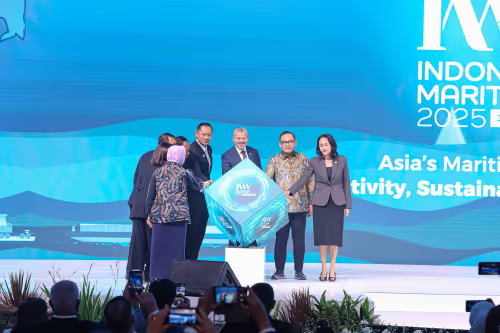
Product walkthrough, trial, POCs, enterprise offering, support and more. Speak with one of our specialists.


Product walkthrough, trial, POCs, enterprise offering, support and more. Speak with one of our specialists.

Climate changes

Jakarta, May 26, 2025 — The maritime sector is now under the spotlight in the global effort to reduce carbon emissions. In a discussion titled “Sailing Stronger: ESG Synchronization for ND Targets, Green Shipping, and Global Carbon Economy”, part of the Indonesia Maritime Week (IMW) 2025, stakeholders emphasized the urgency of transforming the shipping industry towards greener and more sustainable practices.
According to Edwin Hartanto, Head of Carbon Trading Development at IDX Carbon, the energy and transport sectors—including marine shipping—are major contributors to global carbon emissions. The sector is facing international regulatory pressure such as the EU Emission Trading System (EU ETS), UK ETS, and ambitious IMO targets aiming for net-zero emissions by 2050.
“Emission reductions depend not only on policy but also on the integration of ESG and structured financing, including instruments like green bonds and IDX Green Equity,” said Edwin.
He explained that the Indonesia Stock Exchange, through IDX Carbon, is pushing for the launch of IDX Green Equity—an initiative to bridge the gap in the implementation of Indonesia’s Sustainable Finance Taxonomy and attract capital flows into environmentally focused projects in the capital market.
Soegeng Riyadi, Director of Engineering and Development at PT Orela Shipyard, stressed that the shift towards green shipping faces serious challenges.
“High transition costs, limited incentives, and technology gaps make it difficult for many industry players to switch to green technologies such as LNG, methanol, hydrogen, or electric and wind propulsion,” he said.
Additionally, international vessels are now required by the IMO to measure their Energy Efficiency Existing Ship Index (EEXI) and Carbon Intensity Indicator (CII)—key benchmarks that determine carbon efficiency and serve as new competitive standards in the global shipping industry.
Although green bonds have become a growing sustainable finance tool in Indonesia, the maritime sector has yet to leverage them effectively.
Doni Setiowibowo, Head of Fixed Income at Kiwoom Sekuritas Indonesia, noted that so far, no green bonds have been issued from the maritime sector. Yet green bonds have proven effective in supporting eco-friendly projects, with total issuance in Indonesia reaching IDR 31.67 trillion as of April 2025.
“Hopefully IMW 2025 will spark maritime green bond issuance initiatives, as this sector is strategic for national decarbonization,” Doni said.
Discussions during IMW 2025 affirmed that a successful green transition in the maritime sector requires a holistic approach—from carbon pricing mechanisms and regulatory support to fiscal incentives.
Edwin Hartanto emphasized the importance of carbon pricing through Emission Trading Systems (ETS) and carbon offsetting as part of a long-term climate strategy, especially in the maritime context.
“The financial market is getting greener. If the maritime sector wants to stay globally competitive, ESG transformation can no longer be delayed,” he asserted.
As the world’s largest archipelagic nation with over 17,000 islands, Indonesia plays a crucial role in shaping a low-emission shipping ecosystem. Indonesia Maritime Week 2025 marks a pivotal moment to drive cross-sector collaboration, investment, and innovation.
However, as the forum’s speakers concluded, time is of the essence. Without concrete action and adequate financing systems, Indonesia’s ambition to become a global maritime axis and blue economy hub risks falling behind global sustainability trends.
Agus Harimurti Yudhoyono (AHY), Coordinating Minister for Infrastructure and Regional Development, officially opened Indonesia Maritime Week (IMW) 2025 at the Jakarta Convention Center. With the theme "Asia's Maritime Leadership: Connectivity, Sustainability, and Digitalization," AHY emphasized the critical importance of maritime space in determining Indonesia’s future.
“Indonesia’s future depends greatly on how we manage our maritime space—from port investment and low-carbon shipping to the training of professional seafarers,” said AHY, as quoted from a Ministry of Transportation press release.
He expressed hope that IMW 2025 would not merely be ceremonial, but also a platform for long-term dialogue and innovation in the maritime sector. He also thanked the Ministry of Transportation and INSA for organizing this international forum.
Antoni Arif Priadi, Secretary General of the Ministry of Transportation and Chairperson of IMW 2025, added that the maritime sector contributes about 7% to national GDP. Indonesia, as the largest archipelagic country, holds vast potential in seafarers and marine resources.
“We are focused on strengthening port infrastructure, digitizing shipping systems, and building international partnerships to realize an inclusive blue economy,” Antoni stated.
He emphasized the importance of cross-sector collaboration and advanced maritime technology to boost efficiency, safety, and connectivity across the archipelago. This vision aligns with Indonesia Emas 2045 and the Asta Cita of President Prabowo Subianto.






















Jejakin’s green programs combine high-tech monitoring, biodiversity restoration, and community-led initiatives to deliver powerful, sustainable change across ecosystems.








